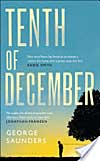![]()
 Tenth of December
Tenth of December
by George Saunders
Bloomsbury Publishing, 2013
Don’t be afraid of the hype; this third collection by George Saunders lives up to it. There is a new dimension to Tenth of December, which sneaks up on you and takes hold. The absurdist elements are here, as always, though tampered down some, and the satirical humor runs high, as always, but now we have a more empathetic overtone. It’s a subtle but powerful shift.
Take the longest story, “The Semplica Girl Diaries”: SGs, we learn, are lovely ethnic women used by homeowners to decorate their lawns. The SGs are strung together with a thread through the brain (which can be removed without harm) which leaves them docile, swinging from a ‘microline’ in long flowing white dresses in the front yard. Classic Saunders. Our narrator here is a home owner, a family man, who is keeping a diary for future generations so they can see how life was really lived. He is not as well off as his neighbors, not as well off as his daughter’s best friend’s family, who are very rich and have everything. He cannot even afford to give her the birthday present she wants, which is quite pricey. Unlike his daughter’s friend’s family, he has a rundown house and no lawn ornaments whatsoever, especially no costly SGs. He’s struggling to pay his many credit card bills, in fact. He feels bad that he cannot provide better for his family. Yes, he may be partly at fault for not doing better, and he is at fault for wanting to keep up with the neighbors and for caving to a consumer society which demands that a parent give expensive gifts to their children, but his heart is in the right place. Above all he wants his family to be happy and he’s doing all he can to make that happen. Here is an entry:
Stood looking up at house, sad. Thought: Why sad? Don't be sad. If sad, will make everyone sad . . . Have to do better! Be kinder. Start now. Soon they will be grown and how sad, if only memory of you is testy stressed guy in car.
I've already reminded myself of that about half a dozen times—so full of simple truth it hurts.
“Escape from Spiderland” takes us again to a slightly futuristic setting, as so many of his stories do. Spiderland is a prison facility which tests new drugs on the inmates, and then, when necessary, subjects them to a psychological evaluation. One drug makes people fall in love, hard and fast. They are permitted to act on this and have sex. One inmate is given the drug twice. When it has worn off the second time, he is summoned by the authorities and asked which woman he loved the most. The one he does not love the most, he is told, will get a dose of Darkenfloxx™ which makes one feel horrendously depressed. The direction the story takes from here is unpredictable and quite moving.
“Puppy” is a story about a suburban wife and mother—who has survived a miserable up-bringing—who wants a puppy for her children and responds to an ad in the paper from a woman who wants to give one away. It turns out the woman giving away the puppy is doing so for a very strange reason. The suburban mom is shocked by the squalor in which this woman lives and then horrified by the circumstances that led the woman to place the ad. We relate to her feelings, but amazingly Saunders also leaves us feeling compassion for the other woman.
On a darker note, there is “Victory Lap,” which tells the story of a young girl on the cusp of her 15th birthday—happy, naïve, full of herself. A ‘meter reader’ lures her to the back yard. He has a knife and his intention is rape. Her nerdy neighbor Kyle witnesses the abduction. His parents would have told him to ‘stay out of it,’ but he reacts unpredictably.
Perhaps the most powerful in this powerhouse of a collection is the title story, “Tenth of December.” One voice is that of a 53-year-old man who is dying of cancer and decides to commit suicide by going off into the cold winter woods to die; the other comes from a misfit of a kid, a young boy with ‘unfortunate Prince Valiant bangs and cublike mannerisms,’ who envisions a fantasy world of ‘Netherworlders’ to create adventures. The juxtaposing of the two voices and the intersection of their lives is the epitome of what is new in this book: that element of empathy, of compassion, slides in and takes root in your soul. If I were to relay the plots of some of Saunders’ earlier work, I would talk about some of the dazzling, laugh-out-loud, absurdist scenarios, which never fail to say something about our world—for Saunders is a haunting visionary—but it’s the disturbing zaniness of it all that I best remember— the hilarious spiel by the self-help guru entitled "Don’t crap in my oatmeal," for instance. There is that to be found here as well—SGs, for example (brilliant concept or what?) —but this time, even more than the strung-up SGs, the biggest impact comes from the guy saying ‘how sad, if only memory of you is testy stressed guy in car.’ Saunders gives you everything you’ve ever liked in his writing, and this time, in addition, what can I say? Kind of leaves you wanting to be a better person. J.A.
©TBR 2013
This review may not be archived, reproduced or distributed further without the author's express permission. Please see our conditions of use.
The Barcelona Review is a registered non-profit organization